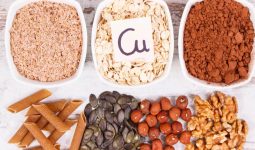You might be surprised to hear of this if this is your first time. Well, vitamin F is nothing but essential fatty acids (EFAs). These essential fatty acids are important for many biological processes.
This vitamin is classified as a fat and it benefits the body in several ways. It aids the speedy healing of wounds, it boosts metabolism, and improves the health of your skin and nails.
This post will help you to understand this vitamin better. You would know the amazing health benefits of vitamin F and also rich natural sources of these nutrients.
The Constituents of Vitamin F
Vitamin F is made up of two essential fatty acids. They are the linoleic acid (LA (Omega-6)) and the alpha-linoleic acid (ALA (Omega-3)). The human body depends heavily on these fatty acids for repair and development of tissues.
Note that your body cannot make these fatty acids. You have to get them from your diet.
A deficiency in any of these fatty acids can cause health problems. Some of them are skin bruising, dry eyes, vision problems, unhealthy skin, hair, nails, and delayed wound healing with high risks of infection.
Impressive Health Benefits of Vitamin F
Nails and Skin
Vitamin F boosts the health of your skin and nails. In cases of deficiency, your nails and skin will become dry and brittle. Your nails would be prone to peelings and they would grow slowly.
Your nails would split and break easily. Your skin would easily tear or bruise. LA, a component of vitamin F protects your skin against inflammation. It even treats acne and other skin conditions.
Aids weight management
Vitamin F helps you burn saturated fats. This would prevent excessive weight gain and obesity. It supports the metabolism of fats in your body. This makes it easier for you to lose weight.
Boosts mental health
Vitamin F benefits your brain and improves mental performance. It is believed to reduce anxiety and even relieve depression.
Controls blood pressure
This nutrient protects your blood vessels. They also control the levels of hormones which can have a huge effect on your blood pressure.
Reduces your risks of chronic diseases
Vitamin F does this by reducing your levels of bad cholesterol. This would improve the circulation of blood in your body. This, in turn, will prevent strokes, heart disease, heart attacks, etc.
Protects your cells
Vitamin F protects your cells. These fatty acids keep your cell membranes in good shape. Little children need these fatty acids to grow well. It enhances your immune system and controls the levels of cholesterol.
It also balances the levels of hormones in the body.
Rich Sources of Vitamin F
Breast milk
The breast milk of a woman who eats healthy foods is rich in both ALA and LA. These are the main sources of energy for infants. A woman’s breast milk is made up of 55% healthy fats.
Formula milk for infants contains about 49% of fats.
Oils
Oils extracted naturally from nuts and seeds are high in vitamin F. These include flaxseed, sunflower seeds, walnuts, soybean, and corn oils. These are excellent sources of vitamin F.
A tablespoon of flaxseed oil contains 7.3 grams of ALA. Olive oil, safflower oil, and peanut oil are also rich in these essential fatty acids.
Fish
Fish such as tuna, sardines, lake trout, salmon, halibut, mackerel, Anchovies, etc. are rich in vitamin F. the American Heart Association recommends 2 servings of these fatty fish every week.
This would help one get enough essential fatty acids.
Nuts and seeds
These include pine nuts, pecans, Brazil nuts, English walnuts, pine nuts, and sunflower seeds. They are rich in ALA. If you want a high dose of vitamin F, go for oil-roasted sunflower seeds.
This gives 9.7 grams of vitamin F per ounce. English walnuts are also dense in this nutrient, an ounce contains 2.6 grams of vitamin F.
Chia seeds, pumpkin seeds, almonds, etc. you can add this vitamin F-rich nuts and seeds to your daily diet.








